Welcome to A Picture of Health: Jo Spence, a Politics of Disability and Illness, a multi-pronged project curated by Kenny Fries and Elisabeth Frost.
In 1986 the British artist, educator, and activist Jo Spence (1934-1992) described the question fundamental to her work: “how to represent a body in crisis.” Spence’s work, still not as known as we think it should be, reveals powerful political and artistic responses to the experience of inhabiting such a body.
From the start of her career as a photographer, Spence defined herself first as an educator and activist. Her overriding goal was to challenge gender, class, and body norms, a project that gained personal urgency when at 48 she was diagnosed with breast cancer. For the remainder of her life, Spence devoted herself to documenting, and sharing, her own experiences living within a non-normative, disabled, “sick” body.
Ignoring art world expectations, Spence developed practices that merged the aesthetic, the political, the therapeutic, and the educational, using a range of techniques and media—photography, text, collaborative performance, and outreach. She sought not just to document and depict her own experiences but also to make her methods as widely available as possible to those dealing with a hostile medical industry. Her combination of photography (both documentary and staged) with text allowed her to reclaim the narrative of her own body. In her expansive show The Picture of Health? (begun in 1984), Spence developed and disseminated new ways not just to represent a body in crisis but, more significantly, to inhabit such a body.
Today Spence’s work is as timely as ever. This website places The Picture of Health? in the context of the lived experience of chronic illness and of contemporary disability arts.
In The Picture of Health?, Spence sought to reach those affected by breast cancer or other cancer diagnoses, sharing her means of resisting pressure from the medical establishment and her hard-earned knowledge about alternative treatments. She showed The Picture of Health? in community venues—far from sought-after London galleries. Text accompanied the photographs, offering concrete information and powerful personal narratives.
Spence provided a model of documenting personal experiences of acute and chronic illness. She also offered a counter-narrative to medical orthodoxy. In these ways, Spence insisted on clarity and accessibility—qualities that much artwork of her day rejected. In eliminating distinctions between her art and her lived experiences, merging both with education and outreach, Spence transformed her work into a means of empowering those affected by chronic illness and by a too-powerful medical-industrial complex to teach others how they might choose themselves to be embodied.
We’ve chosen to use Spence’s title The Picture of Health? as a jumping-off point for the title of our project, adjusting Spence's title to reflect more of a contemporary idea of what constitutes “health,” replacing Spence’s “the” with “a” to show that there are multiple, various, definitions of “health.” We also decided to eliminate the question mark in Spence’s title to emphasize how each of the artists and writers we highlight here embodies their own “health” in their work and practice. Finally, we added a subtitle to underscore that what you experience on the site is what we, as curators, view as a way to think about, and act upon, the political nature of disability and illness, acknowledging there are many ways forward.
The Artists
 Jo Spence
Jo Spence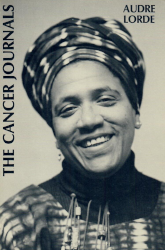 Audre Lorde
Audre Lorde Yvonne Buchheim
Yvonne Buchheim Guadalupe Maravilla
Guadalupe Maravilla Simon Watney
Simon Watney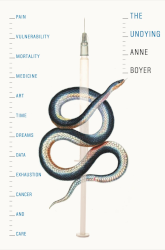 Anne Boyer
Anne Boyer Suleika Jaouad
Suleika Jaouad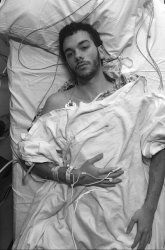 Joey Solomon
Joey Solomon Stephen Starkman
Stephen Starkman Andrea Gibson
Andrea Gibson Mary Cappello
Mary Cappello Alicia Ostriker
Alicia Ostriker Pelenakeke Brown
Pelenakeke Brown Navild Acosta and Fannie Sosa
Navild Acosta and Fannie Sosa Perel
Perel Alice Wong
Alice Wong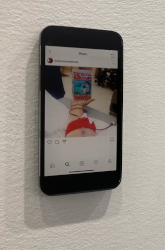 Carolyn Lazard
Carolyn Lazard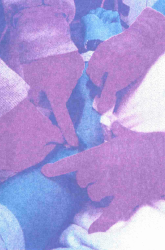 Ezra Benus
Ezra Benus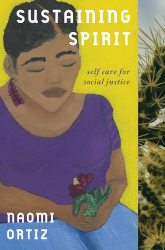 Naomi Ortiz
Naomi Ortiz Cancer Care Collective
Cancer Care CollectiveAbout Kenny Fries
Kenny Fries received the Creative Capital literature award for In the Province of the Gods. He is the author of Body, Remember: A Memoir and The History of My Shoes and the Evolution of Darwin’s Theory, and the editor of Staring Back: The Disability Experience from the Inside Out. His books of poems include In the Gardens of Japan, Desert Walking, and Anesthesia. His current work-in-progress is Stumbling over History: Disability and the Holocaust, excerpts from which have appeared in The New York Times, The Believer, and Craft, and are the basis for his video series What Happened Here in the Summer of 1940?
About Elisabeth Frost
Elisabeth Frost’s books include All of Us: Poems (White Pine Press), Bindle (Ricochet Editions, a collaboration with artist Dianne Kornberg), and The Feminist Avant-Garde in American Poetry (University of Iowa Press). She also co-edited Innovative Women Poets: An Anthology of Contemporary Poetry and Interviews (Iowa). The recipient of grants from the Fulbright Foundation, The Rockefeller Foundation’s Bellagio Center, MacDowell, Yaddo, and others, Frost has published poetry and criticism widely. She is Professor of English and Women’s/Gender/Sexuality Studies at Fordham University, where she edits the Poetic Justice Institute Prizes, a poetry book series from Fordham University Press.
